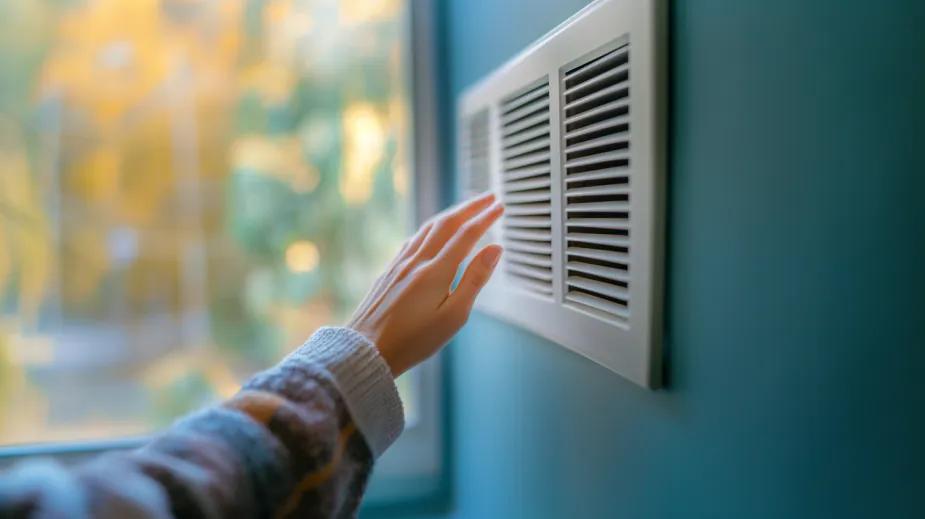Why Isn’t My AC Cooling My Home Effectively?

On a sweltering summer day, inadequate cooling can make the temperature – and, perhaps, your temper – rise. If the air blowing from your vents isn’t cool enough to keep you comfortable, your air conditioning system might be struggling to work efficiently, leading to both discomfort and reduced performance.
Causes and Solutions for Inadequate AC Cooling
Whether the air from your vents is hot, warm, or just not cool enough, diagnosing and addressing the issue is essential for restoring comfort in your home. Common reasons your AC might not be cooling effectively include:
1. Dirty or Clogged Air Filters
If your AC is running but not cooling your home effectively, start by checking the air filter. A clogged filter can restrict airflow, leading to reduced performance and causing the system to blow warm or only slightly cool air.
Solution: Inspect and replace the air filter regularly, usually every 1-3 months, depending on the type of filter, its efficiency, and environmental factors in your home. A clean air filter helps air flow properly and makes your AC work more efficiently, so your home stays cooler and more comfortable.
2. Low Refrigerant Levels
Refrigerant is the lifeblood of your cooling system – it extracts warm indoor air and releases it outside through the condenser unit. If the refrigerant is low due to a leak or inadequate charging, the system will struggle to cool the air effectively. You can tell if there’s a refrigerant leak if you notice reduced cooling efficiency, ice buildup on the evaporator coils, or hear a hissing sound coming from the AC unit.
Solution: Reach out to an HVAC contractor to find and fix the leak and recharge your system with the right amount of refrigerant. Taking care of leaks quickly will prevent further damage and get your cooling back on track.
3. Leaking or Blocked Ductwork
Leaks or blockages in the ductwork can cause a loss of cooled air, decreasing overall cooling efficiency. If the ductwork is damaged or obstructed, it may prevent cold air from reaching its intended destinations, resulting in air that feels warm or cool but not cold enough.
Solution: Inspect the ductwork for any signs of damage or obstructions. Repair leaks with duct sealant or tape, and clear any blockages to ensure proper airflow. For serious ductwork damage, contact an HVAC technician.
4. Dirty Condenser Coil
The condenser coil in the outdoor unit expels heat absorbed from your home. Over time, the condenser coil can become dirty or covered with debris, reducing its ability to release heat effectively and impacting your system’s cooling performance.
Solution: Regularly clean the condenser coil to get rid of dirt and debris. You can gently hose them off or use a coil cleaner, but make sure the power is turned off first. Keeping the area around the condenser unit free of debris will also help keep it running efficiently. This type of cleaning is usually part of a professional AC maintenance visit in the spring, which helps ensure your system runs smoothly all summer long.
5. Malfunctioning Compressor
The compressor plays a key role in cooling your home by circulating the refrigerant. If the compressor isn’t working properly, it can impact the system’s ability to cool the air effectively, which might result in only slightly cool air coming from your vents.
Solution: if you notice inconsistent cooling, unusual noises, weak airflow, or frequent cycling (short cycling), contact an HVAC technician to inspect and repair or replace the compressor as needed.
6. Incorrectly Sized AC Unit
An AC unit that is too large or too small for your home can also lead to inefficient cooling. A unit that is too large may cycle on and off too frequently, while one that is too small may struggle to cool effectively.
Solution: If you think your AC unit might be the wrong size, talk to an HVAC professional. They can do a load calculation to determine the right size for your home and suggest adjustments or replacements if needed.
7. Poor Insulation
If your home isn’t well-insulated, the cooled air from your AC might not stay cold by the time it reaches various rooms. Poor insulation can let heat from outside or other areas seep in, making the air feel just cool instead of cold and causing your AC to work harder to keep things comfortable.
Solution: Inspect your home’s insulation in walls, attics, floors, and around windows and doors. Add or update insulation where needed to better retain temperature and cut down on air leaks. You might also use weatherstripping or caulking to seal any gaps. For a complete check-up, consider contacting a professional. Better insulation makes your AC more efficient and boosts overall comfort.